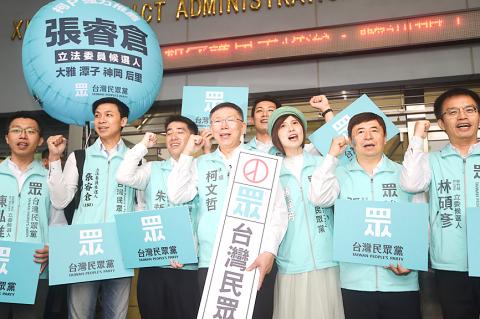Taipei Mayor Ko Wen-je (柯文哲), chairman of the Taiwan People’s Party (TPP), yesterday said he was continuing with his experiment to develop what he described as an “atomic bomb” that he hoped would have a big influence on Taiwanese politics.
Ko made the remarks on the sidelines of a rally for TPP legislative candidates in front of the Taipei Election Commission. He had taken a couple of hours off from his mayoral duties to show his support for the party’s nominees on the first day of registration for legislative candidates.
He first arrived at the headquarters of an online live broadcasting platform in Taipei to promote the TPP candidates, before joining those running for seats in Taipei.

Photo: Fang Pin-chao, Taipei Times
They chanted slogans in front of the city commission: “Push the pan-blue and pan-green camps to the side and put the people back in the center” and “Let Taiwan reboot and the Legislative Yuan have new opportunities.”
“Innovation is the only path for Taiwan,” Ko said, adding that as a smaller party with less resources, the TPP has to find new ways to promote itself, such as soliciting votes through new media platforms.
No matter how difficult it might be for TPP candidates to secure seats in the Jan. 11 elections, he has often encouraged them to do their best and go on bravely forward, Ko said.
He added that he was continuing with his experiment to develop an “atomic bomb” — signifying his intent to make a big difference to local politics.
Asked whether the TPP has decided on its list of legislators-at-large, Ko said the party plans to register them tomorrow — before the Friday deadline.
Asked about reports that the announcement has been delayed because potential nominee Cynthia Wu (吳欣盈), deputy chief executive of Shin Kong Life Insurance Co and granddaughter of Shin Kong Group founder Wu Ho-su (吳火獅), was having difficulty persuading her family about her plan to become a politician, Ko said: “Everyone will know [who is on the list] on Wednesday morning.”
Although Taiwan is a free and democratic country, it still lags behind democratic states such as Sweden and Switzerland, as many Taiwanese businesspeople are hesitant about openly funding political parties and would rather donate cash without getting a receipt, he said.
Ko reiterated that the TPP’s goal is not to attract large cash donations, but to raise campaign funds through online platforms.

Taiwanese can file complaints with the Tourism Administration to report travel agencies if their activities caused termination of a person’s citizenship, Mainland Affairs Council Minister Chiu Chui-cheng (邱垂正) said yesterday, after a podcaster highlighted a case in which a person’s citizenship was canceled for receiving a single-use Chinese passport to enter Russia. The council is aware of incidents in which people who signed up through Chinese travel agencies for tours of Russia were told they could obtain Russian visas and fast-track border clearance, Chiu told reporters on the sidelines of an event in Taipei. However, the travel agencies actually applied

Japanese footwear brand Onitsuka Tiger today issued a public apology and said it has suspended an employee amid allegations that the staff member discriminated against a Vietnamese customer at its Taipei 101 store. Posting on the social media platform Threads yesterday, a user said that an employee at the store said that “those shoes are very expensive” when her friend, who is a migrant worker from Vietnam, asked for assistance. The employee then ignored her until she asked again, to which she replied: "We don't have a size 37." The post had amassed nearly 26,000 likes and 916 comments as of this

New measures aimed at making Taiwan more attractive to foreign professionals came into effect this month, the National Development Council said yesterday. Among the changes, international students at Taiwanese universities would be able to work in Taiwan without a work permit in the two years after they graduate, explainer materials provided by the council said. In addition, foreign nationals who graduated from one of the world’s top 200 universities within the past five years can also apply for a two-year open work permit. Previously, those graduates would have needed to apply for a work permit using point-based criteria or have a Taiwanese company

The Shilin District Prosecutors’ Office yesterday indicted two Taiwanese and issued a wanted notice for Pete Liu (劉作虎), founder of Shenzhen-based smartphone manufacturer OnePlus Technology Co (萬普拉斯科技), for allegedly contravening the Act Governing Relations Between the People of the Taiwan Area and the Mainland Area (臺灣地區與大陸地區人民關係條例) by poaching 70 engineers in Taiwan. Liu allegedly traveled to Taiwan at the end of 2014 and met with a Taiwanese man surnamed Lin (林) to discuss establishing a mobile software research and development (R&D) team in Taiwan, prosecutors said. Without approval from the government, Lin, following Liu’s instructions, recruited more than 70 software